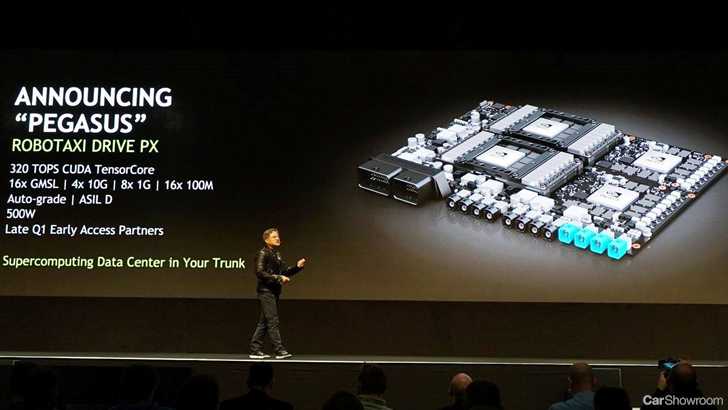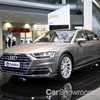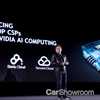The sphere that encompasses the increasing intelligence and computing power of cars, one that will eventually lead us to reliable and idiot-proof autonomous driving, continues to grow larger. But the major influencers to most people are the car manufacturers themselves, often forgetting that the actual hardware is often outsourced.
Nvidia, best known as the world’s most prolific maker computer graphics cards, is taking a vertically integrated approach by choosing to lead the development charge in terms of powerful silicon that’s optimised to work with high level self driving software.
At a recent announcement, the company announced that their upcoming iteration of the Drive PX platform - called Pegasus - will be able to execute over 320 trillion operations per second, resulting in a tenfold increase in compute power over the version it replaces. But rather than keep their technology entirely proprietary, they will as before offer it to the world’s automakers to equip them with the most capable hardware to match their increasingly complex self-driving software.
In fact, Nvidia claims that the compute power they are putting into the hands of automakers with Pegasus will be able to facilitate Level 5 autonomy, which essentially is the highest foreseeable degree to which the vehicle can operate independent of human intervention
Power efficiency, thermal management, and miniaturisation has been the most key of priorities for the Taiwanese company. Nvidia said that Pegasus has the computational horsepower of a “100-server data centre in the form-factor size of a license plate.” Rollout plans for the hardware is expected to include their most longstanding partners such as Audi, Toyota, Volvo, and Tesla.
Currently, most automakers do not offer self-driving functionality beyond Level 2, though Audi has recently claimed that their new A8 flagship sedan will be the first to be feature Level 3 autonomy. There’s a whole other problem there too due to heightened self-driving capability not being fully approved by regulators, Audi is apparently not allowed to fully utilise the A8’s new smarts.
In response to this, carmakers who are furiously chasing the autonomous driving horizon are electing to short shift the usual progression right to Level 5 instead - once that’s ready - since the varying levels of self-driving capability might lull drivers into false expectations.
Nvidia is also in direct competition with Intel, who also supplies powerful hardware systems that make self-driving cars possible, processing in real time the vast amounts of data being delivered concurrently through the many sensors, cameras, hub feeds, and mapping data that allow the car to ‘see’ and interpret the world around it. Only then can the car actually deduce the best course of action, especially important during unexpected situations where quick, measured responses are could mean the difference between life and death.
"Creating a fully self-driving car is one of society's most important endeavors -- and one of the most challenging to deliver," said Jensen Huang, NVIDIA founder and CEO. "The breakthrough AI computing performance and efficiency of Pegasus is crucial for the industry to realize this vision.
"Driverless cars will enable new ride- and car-sharing services. New types of cars will be invented, resembling offices, living rooms or hotel rooms on wheels. Travelers will simply order up the type of vehicle they want based on their destination and activities planned along the way. The future of society will be reshaped," he said.
























